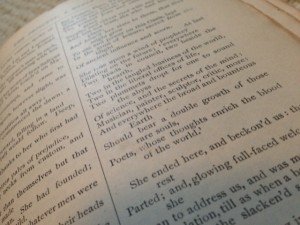Why Aren’t We Memorizing Poems Anymore?

Purchase William E. Dimorier: Servant Leader
In 1916, the subject of my research, William E. Dimorier, an educator and poet, wrote an article called, “Significance of Poetry” for the Journal of Education. He begins his piece,
The memorizing of choice passages of poetry is a popular and well established practice in high schools. In this materialistic age it is well that such is the case. The practice will keep alive the spirit of poetry. It will, we hope, inspire ‘some mute inglorious Milton’ and raise up ‘a double growth of those rare souls, Poets, whose thoughts enrich the blood of the world.’
The first quote comes from “Elegy Written in a Country Churchyard” by Thomas Gray (1716–1771), which I know I read in college, but I couldn’t have made this reference without Google.
The second quote comes from a rather lengthy Alfred Lord Tennyson poem called “The Princess,” which I may, or may not, have read. At a thousand pages of reading a week in grad school, I don’t remember much of the details. This is contrary to a certain friend of mine, who can rattle off passages and make literary references that make me wonder if I even deserve my master’s degree in English. I often wondered why she was so good at memorizing and recall, and now I think might have the answer, or at least part of it.
After reading Dimorier’s statement about memorizing poems, I thought back to my own education and could only remember one time, in grade school, when I had to memorize a poem. So, I posed a question about memorization on Twitter, Facebook, and LinkedIn. The respondents varied in age, but none of them reported having done a lot of memorizing, except for that one friend, who said she hadn’t memorized a lot of poems, but as a United Methodist kid, she had memorized a lot of Bible verses. Well, that could be the key. I didn’t memorize Bible verses in Catholic school.
One of Dimorier’s obituaries stated that he had committed more than 600 poems to memory. How did he do that? Simple. If you’re raised memorizing, it becomes easy to do. Think of oral tradition and all of those guys who memorized the entire Bible over generations. It was quite some time before the Bible was actually committed to paper, you know.
Shedding some light on the sharp contrast between English curriculum then and now, Michael Knox Beran, wrote “In Defense of Memorization” for City Journal in 2004. He says,
“It wasn’t so long ago that kids in public schools from Boston to San Francisco committed poems like Shelley’s ‘To a Skylark’ and Tennyson’s ‘Ulysses’ to memory. They declaimed passages from Shakespeare and Wordsworth, The Psalms and the Declaration of Independence. Even in the earliest grades they got by heart snippets of ‘The midnight Ride of Paul Revere’ or ‘Abou Ben Adhem.’ By 1970, however, this tradition was largely dead.”
Beran notes that the New York City “1927 Course of Study in Literature insisted on the importance of memorizing both poetry and prose orations.” An observer in a 1912 classroom remarked on how quickly the children were able to master complex passages. Beran reminds us that, “memorization is a kind of exercise that strengthens the powers of the mind, just as physical exercise strengthens those of the body.”
Beran also asserts that contrary to the belief of the progressives’ educational philosophy, memorizing poetry is not a sterile process, and it does not oppress children. He says, “The older techniques, by contrast, are genuinely liberating. They build up in the child a more powerful mental instrument, one that will allow him, in later life, to make good use of his freedom. . . . Classic poetry and rhetoric give kids a language, at once subtle and copious, in which to articulate their own thoughts, perceptions, and inchoate [not fully developed] feelings.”
What would my research subject, Dimorier, would think of literature instruction today? He’d probably be devastated.
If my kids were still small, or under 18, I’d have them start memorizing some poems tonight. But, they are not, so I think I will get on that myself. I don’t think I’ll ever catch up with that friend of mine, but just as I work out in the morning, I think I’ll start memorizing poems in the evening. And what better poems to start with than those of W. E. Dimorier? Stay tuned for more information on this project.




Leave a Reply